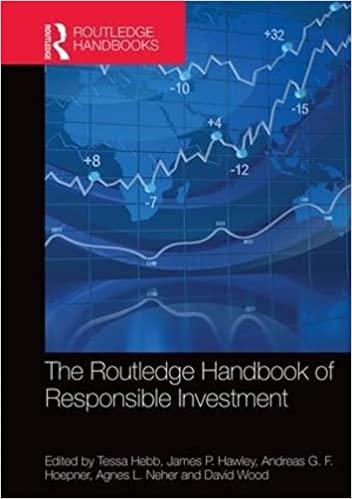Question
Youve found your dream house/apartment/room, and you apply for a $500,000 mortgage from your local bank after seeing an ad on your Instagram feed for
Youve found your dream house/apartment/room, and you apply for a $500,000 mortgage from your local bank after seeing an ad on your Instagram feed for a 7.50%, 30-year mortgage. After you show your W-2 (wage statement) to the loan officer, the bank concludes that you may not be able to afford the monthly payment. They, therefore, offer you a rate of 7.00% (APR) but you must also pay an upfront fee of 3 points. A point, in loan parlance, means 1% of the loan amount. Thus, if you borrow $100,000 and pay 3 points, you must pay $3,000. Even though you receive only the loan proceeds less the points paid, you must repay the entire amount using the amortization schedule for that amount. Points paid are economically equivalent to additional interest on the loan, except the interest is paid upfront. (You should convince yourself that the result is the same whether the bank deducts the points from the loan proceeds or you write a separate check for them.)
Question 3: Assume that you choose the 7.00% plus 3 points mortgage and that you pay off the remaining loan balance at the end of three years instead of over 30 years. What is the true interest rate (use APR) that you have paid over the three years?
Hint: Assume you repay the loan after one day. You will have borrowed the net proceeds (after points) but must repay the entire $500,000 balance and one days interest. You can see thats indeed a hefty interest rate. If, however, the loan is repaid over 30 years as in (a) above, the extra interest is spread out over the 30 years. Your true interest rate over 3 years is going to fall between the rate in (a) and the rate you pay when you borrow the net proceeds and repay $500,000 one day later. There are a couple of ways to tackle this problem. The easiest is to use IRR. Input the cash flowsthe points, the loan proceeds, the 36 payments, and the loan repayment (the loan balance at the end of the 3 years)using the correct sign convention, positive for inflows and negative for outflows. IRR will give you the correct answer. To solve it with Excel using the NPER, RATE, PV, PMT, and FV formulas, remember that your PV is the net loan proceeds (after points), your PMT remains the same, but the FV is the amount that you owe to the bank after 36 paymentsyou must calculate that.
Step by Step Solution
There are 3 Steps involved in it
Step: 1

Get Instant Access to Expert-Tailored Solutions
See step-by-step solutions with expert insights and AI powered tools for academic success
Step: 2

Step: 3

Ace Your Homework with AI
Get the answers you need in no time with our AI-driven, step-by-step assistance
Get Started


